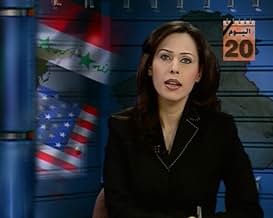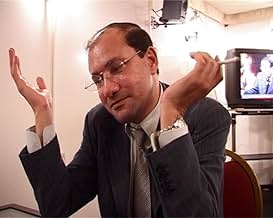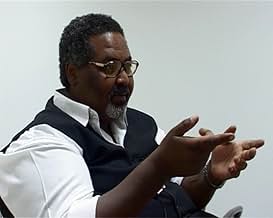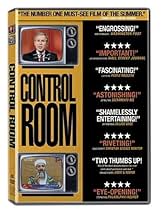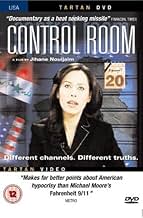CALIFICACIÓN DE IMDb
7.6/10
5.3 k
TU CALIFICACIÓN
Agrega una trama en tu idiomaA documentary on perception of the United States's war with Iraq, with an emphasis on Al Jazeera's coverage.A documentary on perception of the United States's war with Iraq, with an emphasis on Al Jazeera's coverage.A documentary on perception of the United States's war with Iraq, with an emphasis on Al Jazeera's coverage.
- Dirección
- Guionistas
- Elenco
- Premios
- 9 premios ganados y 10 nominaciones en total
Josh Rushing
- Self
- (as Lt. Josh Rushing)
George W. Bush
- Self
- (material de archivo)
Donald Rumsfeld
- Self
- (material de archivo)
- Dirección
- Guionistas
- Todo el elenco y el equipo
- Producción, taquilla y más en IMDbPro
Opiniones destacadas
When Defense Secretary Donald Rumsfeld declares in the early stages of the Iraq War, ''Truth ultimately finds its way to people's eyes and ears and hearts,'' I knew I would like 'Control Room.' I did feel truth peeking through the eyes of the Al Jazeera Satellite Network war coverage, perhaps the most damning moment coming when the coalition forces attack the Al-Jazeera building and kill a prominent journalist.
Egyptian-born, Harvard-educated director Jehane Noujaim, having worked with D. A. Pennebaker and Chris Hegedus on ''Only the Strong Survive'' and ''Startup.com,' is no objective documentarian: She cuts her film to the best advantage of the Arab network as the voice of the Arab oppressed and to the obvious discomfort of the ' occupying' forces, especially the US.
If you factor in her bias and listen to the occasionally reasonable Centcom Press Officer, Lt. Josh Rushing, you may yet believe that Rumsfeld's 'truth' comes more from the beleaguered Arab network than the carefully controlled coalition. But Rushing provides the most truth in the film, for instance, when he confesses, 'Our rule back here is to not spin, but sometimes we catch ourselves doing a little spin on a story. You can't help it.' Lt. Rushing is one of the more interesting characters, at first a central-casting officer spouting the Pentagon message. But when he sees film of suffering and dead American soldiers, he admits, "It makes me hate war." Regardless of which side you're on, most viewers can relate.
When an Arab producer exclaims that the drama unfolding is just like an American movie, where the god guys are easily identifiable, the bad guys will be punished, and the audience wants to know how the ending will be reached, the director mixes fiction and reality in a way that reminds all students of film there cannot be truly unbiased films once someone picks up a camera.
Let 'Control Room' stand tall next to last year's Earl Morris documentary 'Fog of War,' starring a still-sharp and still-deluded Robert McNamara, looking a bit like Donald Rumsfeld. His statement about Al Jazeera, ''We are dealing with people who are willing to lie to the world to make their case,'' is too ironic to be left out of a documentary that makes a liberal criticism of the neocons' great war seem, well, believable.
There are so many secrets and lies in the world political scene today that I am reminded of Joseph Conrad's Marlow in 'Heart of Darkness,' who said there was 'a flavor of mortality in lies, -- which is exactly what I hate and detest in the world -- what I want to forget.' The official body count in Iraq may be mute testimony to the legacy of lies. Like the 9/11 Commission report on the lack of connection between Iraq and al Quaida, 'Control Room' tries to balance the scales before Michael Moore's 'Fahrenheit 9/11' upsets it even more.
Egyptian-born, Harvard-educated director Jehane Noujaim, having worked with D. A. Pennebaker and Chris Hegedus on ''Only the Strong Survive'' and ''Startup.com,' is no objective documentarian: She cuts her film to the best advantage of the Arab network as the voice of the Arab oppressed and to the obvious discomfort of the ' occupying' forces, especially the US.
If you factor in her bias and listen to the occasionally reasonable Centcom Press Officer, Lt. Josh Rushing, you may yet believe that Rumsfeld's 'truth' comes more from the beleaguered Arab network than the carefully controlled coalition. But Rushing provides the most truth in the film, for instance, when he confesses, 'Our rule back here is to not spin, but sometimes we catch ourselves doing a little spin on a story. You can't help it.' Lt. Rushing is one of the more interesting characters, at first a central-casting officer spouting the Pentagon message. But when he sees film of suffering and dead American soldiers, he admits, "It makes me hate war." Regardless of which side you're on, most viewers can relate.
When an Arab producer exclaims that the drama unfolding is just like an American movie, where the god guys are easily identifiable, the bad guys will be punished, and the audience wants to know how the ending will be reached, the director mixes fiction and reality in a way that reminds all students of film there cannot be truly unbiased films once someone picks up a camera.
Let 'Control Room' stand tall next to last year's Earl Morris documentary 'Fog of War,' starring a still-sharp and still-deluded Robert McNamara, looking a bit like Donald Rumsfeld. His statement about Al Jazeera, ''We are dealing with people who are willing to lie to the world to make their case,'' is too ironic to be left out of a documentary that makes a liberal criticism of the neocons' great war seem, well, believable.
There are so many secrets and lies in the world political scene today that I am reminded of Joseph Conrad's Marlow in 'Heart of Darkness,' who said there was 'a flavor of mortality in lies, -- which is exactly what I hate and detest in the world -- what I want to forget.' The official body count in Iraq may be mute testimony to the legacy of lies. Like the 9/11 Commission report on the lack of connection between Iraq and al Quaida, 'Control Room' tries to balance the scales before Michael Moore's 'Fahrenheit 9/11' upsets it even more.
I spent some of last summer in Spain, traveling alone for a couple weeks, as well as another week with my father, a Colombian immigrant. The two and a half weeks that I spent there alone were an unforgettable experience, despite the difficulty of speaking only the most basic, functional Spanish. I essentially knew how to order coffee and ask where the bathroom was, so I was limited to going into cafés and pubs and ordering what I could point to. Once my father arrived, speaking perfect Spanish, I was able to experience a much wider variety of what Spain has to offer (not the least of which is the astonishingly delicious paella), and my father, having not been back to Colombia in 35 years and never having been to Europe, was equally astounded not just by the class and sophistication of the country and its people, but by what could be found in bookstores.
Upon visiting the breathtaking Guggenheim Museum in a moderate sized town in northern Spain called Bilbao, my father came upon a Spanish book about the war in Vietnam. In perusing through the book, he and I were both shocked at the things that were shown in it, particularly of the atrocious acts of American soldiers. It's not portraying America in a bad light, just not portraying them only in a good light, it shows both sides, and it shows that the news outlets in America really play a serious role in, to use the red flag word, propagandizing wars.
Control Room is a study of the Arab news network al Jazeera and how this trend continues to this day. It is well known that the Bush administration is among the most secretive administrations in United States history, under the pretext of the struggle against terrorism and the dangers in alerting the public, and thus the enemy, to all of its policies and actions. What is truly disturbing, however, is the extent to which this secrecy, at some level justified, is so grandly abused. Donald Rumsfeld, our Secretary of Defense under President Bush, appears a couple of times vehemently condemning anyone associated with al Jazeera as a liar, propagandist, enemy of freedom, terrorist, etc. Basically he makes no secret of his opinion that the network itself is a terrorist organization populated and run by all of the above caricatures created by the rhetorical Bush administration.
The movie's most moving sequences, interestingly enough, are those that feature Iraqis, who look exactly what most Americans associate with the typical insurgent or terrorist, sitting around and debating what to do about the impending war, how to protect their children, their families, their livelihood, their lives. Where Michael Moore went completely over the top, showing kids dancing in the streets under Saddam and people getting married (his intent to show some level of normal life, even under Saddam, was instantly eclipsed by his opponents immediately pretending that he wants people to believe Moore thought it was all fun and games under Hussein), Control Room simply walks in with a camera, filming normal Iraqi men and women anxiously watching the news, fearful for their safety, not from Hussein and not even from their liberators, but from the invaders.
In one telling scene, an Iraqi man criticizes Saddam Hussein, itself a dangerous thing to do under the dictatorship, for not being more prepared for the incoming attack in order to protect himself. This man was disappointed in Saddam not for being a brutal dictator, but for allowing the Americans to take over.
The most damaging assessment that the movie makes against Americans is the way the Arab news outlets were destroyed. In one day, three separate attacks were clearly aimed at news outlets, under the pretense that they were distributing terrorist propaganda, but still with the result that it showed the Iraqi and all of the Arab world that the Americans want total control of what anyone hears about the war. As Bush said, you're either with us or against us. It kind of reminds me of how, if any newspaper or television news station or any kind of media outlet criticizes one of the countless blunders made by the Bush administration, it is instantly dubbed left-wing media by mostly the more idiotic right wing nutcases, like Rush Limbaugh, Michael Savage, and the malicious Ann Coulter.
Theaters and video stores, in the run up to the 2004 election, have been increasingly bombarded with a barrage of political documentaries, mostly after Michael Moore's Fahrenheit 9/11 opened the floodgates of political fervor in the film and video industry. Both sides are guilty of underhanded tactics, and Control Room is not entirely free of taking one side or the other, but it doesn't do it in the same way that Fahrenheit 9/11 twisted things and theorized, nor does it do it in the same way as Fahrenhype 9/11, which criticized Fahrenheit 9/11 as much as possible for as many different underhanded tactics as possible, and then went on to employ those same tactics itself.
Control Room is not a fancy documentary; it was filmed, I believe, entirely on MiniDV, which is becoming the standard in home video cameras, and is comprised mostly of people involved with al Jazeera talking about what it's like to work there, as well as interviews between al Jazeera reporters and American soldiers. Personally, the most disturbing moments in the film were the entirely believable suggestion that the Iraqis celebrating in the streets when Saddam's statue was torn down were brought in by the Americans for the purpose of the photo shoot (this is the definition of textbook military propaganda), and the sickening scene in which one soldier absolutely insists that the nation of Iraq is at least partially responsible for the chaos that followed the fall of Saddam.
This, more than anything else I've ever seen in news or any kind of media, is the clearest example of the total lack of any kind of postwar planning by the Bush administration. They were so clueless about what was going to happen even minutes after they succeeded in taking out Saddam Hussein (by the way, I say 'they' referring to the Bush administration, not to Americans as a whole, in which case I would, of course, use 'we') that I genuinely wonder if they even planned on how to get the soldiers back home to America, or if they thought that Saddam was gone so let's go back to Camp David and play golf.
Oops, there I go going over the top. Now I sound like Michael Moore. But the point that the movie sets out to make, and succeeds in very well, is showing that all sides are necessary. No one side can be in control of all news outlets, because that is a recipe for propaganda. And not only do we have to make sure to allow other people to broadcast their views, we can't just go in and destroy their news stations and claim that it was because they were terrorist agencies, because that act alone presents America as the bullies and, given our logic (or lack thereof) in attacking Iraq after 9/11 rather than seeking out that tragedy's perpetrators, we're doing badly enough in that area already.
Upon visiting the breathtaking Guggenheim Museum in a moderate sized town in northern Spain called Bilbao, my father came upon a Spanish book about the war in Vietnam. In perusing through the book, he and I were both shocked at the things that were shown in it, particularly of the atrocious acts of American soldiers. It's not portraying America in a bad light, just not portraying them only in a good light, it shows both sides, and it shows that the news outlets in America really play a serious role in, to use the red flag word, propagandizing wars.
Control Room is a study of the Arab news network al Jazeera and how this trend continues to this day. It is well known that the Bush administration is among the most secretive administrations in United States history, under the pretext of the struggle against terrorism and the dangers in alerting the public, and thus the enemy, to all of its policies and actions. What is truly disturbing, however, is the extent to which this secrecy, at some level justified, is so grandly abused. Donald Rumsfeld, our Secretary of Defense under President Bush, appears a couple of times vehemently condemning anyone associated with al Jazeera as a liar, propagandist, enemy of freedom, terrorist, etc. Basically he makes no secret of his opinion that the network itself is a terrorist organization populated and run by all of the above caricatures created by the rhetorical Bush administration.
The movie's most moving sequences, interestingly enough, are those that feature Iraqis, who look exactly what most Americans associate with the typical insurgent or terrorist, sitting around and debating what to do about the impending war, how to protect their children, their families, their livelihood, their lives. Where Michael Moore went completely over the top, showing kids dancing in the streets under Saddam and people getting married (his intent to show some level of normal life, even under Saddam, was instantly eclipsed by his opponents immediately pretending that he wants people to believe Moore thought it was all fun and games under Hussein), Control Room simply walks in with a camera, filming normal Iraqi men and women anxiously watching the news, fearful for their safety, not from Hussein and not even from their liberators, but from the invaders.
In one telling scene, an Iraqi man criticizes Saddam Hussein, itself a dangerous thing to do under the dictatorship, for not being more prepared for the incoming attack in order to protect himself. This man was disappointed in Saddam not for being a brutal dictator, but for allowing the Americans to take over.
The most damaging assessment that the movie makes against Americans is the way the Arab news outlets were destroyed. In one day, three separate attacks were clearly aimed at news outlets, under the pretense that they were distributing terrorist propaganda, but still with the result that it showed the Iraqi and all of the Arab world that the Americans want total control of what anyone hears about the war. As Bush said, you're either with us or against us. It kind of reminds me of how, if any newspaper or television news station or any kind of media outlet criticizes one of the countless blunders made by the Bush administration, it is instantly dubbed left-wing media by mostly the more idiotic right wing nutcases, like Rush Limbaugh, Michael Savage, and the malicious Ann Coulter.
Theaters and video stores, in the run up to the 2004 election, have been increasingly bombarded with a barrage of political documentaries, mostly after Michael Moore's Fahrenheit 9/11 opened the floodgates of political fervor in the film and video industry. Both sides are guilty of underhanded tactics, and Control Room is not entirely free of taking one side or the other, but it doesn't do it in the same way that Fahrenheit 9/11 twisted things and theorized, nor does it do it in the same way as Fahrenhype 9/11, which criticized Fahrenheit 9/11 as much as possible for as many different underhanded tactics as possible, and then went on to employ those same tactics itself.
Control Room is not a fancy documentary; it was filmed, I believe, entirely on MiniDV, which is becoming the standard in home video cameras, and is comprised mostly of people involved with al Jazeera talking about what it's like to work there, as well as interviews between al Jazeera reporters and American soldiers. Personally, the most disturbing moments in the film were the entirely believable suggestion that the Iraqis celebrating in the streets when Saddam's statue was torn down were brought in by the Americans for the purpose of the photo shoot (this is the definition of textbook military propaganda), and the sickening scene in which one soldier absolutely insists that the nation of Iraq is at least partially responsible for the chaos that followed the fall of Saddam.
This, more than anything else I've ever seen in news or any kind of media, is the clearest example of the total lack of any kind of postwar planning by the Bush administration. They were so clueless about what was going to happen even minutes after they succeeded in taking out Saddam Hussein (by the way, I say 'they' referring to the Bush administration, not to Americans as a whole, in which case I would, of course, use 'we') that I genuinely wonder if they even planned on how to get the soldiers back home to America, or if they thought that Saddam was gone so let's go back to Camp David and play golf.
Oops, there I go going over the top. Now I sound like Michael Moore. But the point that the movie sets out to make, and succeeds in very well, is showing that all sides are necessary. No one side can be in control of all news outlets, because that is a recipe for propaganda. And not only do we have to make sure to allow other people to broadcast their views, we can't just go in and destroy their news stations and claim that it was because they were terrorist agencies, because that act alone presents America as the bullies and, given our logic (or lack thereof) in attacking Iraq after 9/11 rather than seeking out that tragedy's perpetrators, we're doing badly enough in that area already.
Two things moved me very much about this film:
The first was Lt Rushing, one of the US military media liaison officers at Centcom. His open-mindedness, fairness and plain decency are very rare to find in any spin doctor, let alone one working for an army during a war. He is a credit to himself, his family and his country, and I sincerely hope he hasn't suffered any professional repercussions for his honesty in this piece.
The second was the man who was the head of Al Jazeera. It was funny when he said he would accept a job at Fox News the second it was offered. But it turned out to be heartbreaking when he said as soon as his children are old enough, he'll send them to the US for education, in order to escape the "Arab nightmare" and live the "American dream". It's so sad that that part of the world is such a mess that even people who love it and have grown up there and are rooting for it recognise that there is little hope there for their children. If only that sentiment could be channelled into finding a solution for the problems in the Middle East.
The first was Lt Rushing, one of the US military media liaison officers at Centcom. His open-mindedness, fairness and plain decency are very rare to find in any spin doctor, let alone one working for an army during a war. He is a credit to himself, his family and his country, and I sincerely hope he hasn't suffered any professional repercussions for his honesty in this piece.
The second was the man who was the head of Al Jazeera. It was funny when he said he would accept a job at Fox News the second it was offered. But it turned out to be heartbreaking when he said as soon as his children are old enough, he'll send them to the US for education, in order to escape the "Arab nightmare" and live the "American dream". It's so sad that that part of the world is such a mess that even people who love it and have grown up there and are rooting for it recognise that there is little hope there for their children. If only that sentiment could be channelled into finding a solution for the problems in the Middle East.
They are a horde of sand monkeys screaming hysterically, jumping up and down, waving their fists in the air, and they all have their heads wrapped in tablecloths stolen from Italian restaurants -- right? Well, not quite, according to this documentary from Noujaim, which focuses on the producers and staff of the much-maligned al Jaziera satellite news channel which broadcasts to the Arab-speaking world.
The reporter we get to know best, a big guy who looks like Luciano Pavarotti in makeup for a performance of Otello, and who speaks English fluently (his wife is an Englishwoman), is like most other reporters of whatever channel or nationality -- practical, cynical, and good humored. He doesn't give us an anti-American diatribe. He's way too cool for that. He's watching, for instance, the tape of a demonstration in which yelling, leaping children surround some Americans entering Baghdad and he's listening to the English translation. The children are shouting "Allah" something or other and the on screen translator comments that the kids are saying "God be with you Americans!" The reporter smiles and turns to the camera, explaining that what the kids are actually saying is, "God damn you Americans." He has a keen sense of irony.
So does another translator who is watching Bush's "Mission Accomplished" speech on live TV and giving the Arabic translation to the audience. When Bush is finally finished telling us how successful we and our allies have been, how the war has ended, the translator shuts off his mike, lowers his face and wordlessly chuckles.
At another point, after the victory, Iraqis are seen breaking into a bank, emerging which armfuls of money, which they then gleefully tear up and toss in the air. Watching this on TV an al Jaziera staff member remarks that these are Kurds and they're tearing up the dough because it's the new Dinar with Saddam's picture, and in that region they've always used the old pre-1991 currency. At the same time, elsewhere, an American newsman (from CNN, I think) is watching the scene and calls to someone to find out what it is these looters are tearing up. Is it money, or what? And when asked at a briefing to explain why these looting incidents are going on in the destroyed and chaotic cities, an American general replies that this was going on under the noses of the Iraqis themselves. (In other words, some Iraqi authority should have put a stop to it.) But the film makers are mistaken if they think that most of this isn't already known to American audiences. The problem isn't so much that American audiences were ignorant of some of these things, but that they preferred the perception to the substance. Take the concept of victory. The perception is "the liberated people" pulling down a statue of the reviled Hussein. That's part of the substance too. Another part of the substance is videotape of dead and bloody American bodies sprawled on a cement floor, a part that, like the coffins arriving at Dover AFB, we'd rather exclude. Al Jaziera showed both scenes.
I don't mean any of this to sound too simple minded. It's a thorny problem. Exactly how do you edit the substance so that what appears in the media is acceptable -- in the sense that it doesn't get you fired or killed. The journalist's code of course is to be "objective," but objectivity itself depends on perception.
A sympathetic Marine captain, seen in several interviews, doing his best to answer unanswerable questions, poses the conundrum in its most basic form. Something like, "I was watching American TV and saw shots of these bodies of dead civilians, including kids, and I thought, that's too bad. Then I ate dinner and went to sleep. Recently I was watching al Jaziera and saw shots of bodies of dead American GIs, and I really got MAD. Then I thought, maybe THEY feel the same way." The officer is a surprisingly earnest guy in an impossible job. He's trying to learn Arabic, is terribly flattered when asked to come home and have dinner with Pavarotti and his English wife. His happiness at being treated amicably is almost palpable.
If you put the wrong material on the air, you're liable to pay for it. Al Jaziera's headquarters in Baghdad was bombed during the war and one of its reporters killed. Another Arab news agency was bombed at the same time, and a hotel too. The financial reporter from al Jaziera was banned from the New York Stock Exchange too. (Not mentioned in this film.) We're going to have to wait for another documentary to explain the reasons for that, I guess.
The reporter we get to know best, a big guy who looks like Luciano Pavarotti in makeup for a performance of Otello, and who speaks English fluently (his wife is an Englishwoman), is like most other reporters of whatever channel or nationality -- practical, cynical, and good humored. He doesn't give us an anti-American diatribe. He's way too cool for that. He's watching, for instance, the tape of a demonstration in which yelling, leaping children surround some Americans entering Baghdad and he's listening to the English translation. The children are shouting "Allah" something or other and the on screen translator comments that the kids are saying "God be with you Americans!" The reporter smiles and turns to the camera, explaining that what the kids are actually saying is, "God damn you Americans." He has a keen sense of irony.
So does another translator who is watching Bush's "Mission Accomplished" speech on live TV and giving the Arabic translation to the audience. When Bush is finally finished telling us how successful we and our allies have been, how the war has ended, the translator shuts off his mike, lowers his face and wordlessly chuckles.
At another point, after the victory, Iraqis are seen breaking into a bank, emerging which armfuls of money, which they then gleefully tear up and toss in the air. Watching this on TV an al Jaziera staff member remarks that these are Kurds and they're tearing up the dough because it's the new Dinar with Saddam's picture, and in that region they've always used the old pre-1991 currency. At the same time, elsewhere, an American newsman (from CNN, I think) is watching the scene and calls to someone to find out what it is these looters are tearing up. Is it money, or what? And when asked at a briefing to explain why these looting incidents are going on in the destroyed and chaotic cities, an American general replies that this was going on under the noses of the Iraqis themselves. (In other words, some Iraqi authority should have put a stop to it.) But the film makers are mistaken if they think that most of this isn't already known to American audiences. The problem isn't so much that American audiences were ignorant of some of these things, but that they preferred the perception to the substance. Take the concept of victory. The perception is "the liberated people" pulling down a statue of the reviled Hussein. That's part of the substance too. Another part of the substance is videotape of dead and bloody American bodies sprawled on a cement floor, a part that, like the coffins arriving at Dover AFB, we'd rather exclude. Al Jaziera showed both scenes.
I don't mean any of this to sound too simple minded. It's a thorny problem. Exactly how do you edit the substance so that what appears in the media is acceptable -- in the sense that it doesn't get you fired or killed. The journalist's code of course is to be "objective," but objectivity itself depends on perception.
A sympathetic Marine captain, seen in several interviews, doing his best to answer unanswerable questions, poses the conundrum in its most basic form. Something like, "I was watching American TV and saw shots of these bodies of dead civilians, including kids, and I thought, that's too bad. Then I ate dinner and went to sleep. Recently I was watching al Jaziera and saw shots of bodies of dead American GIs, and I really got MAD. Then I thought, maybe THEY feel the same way." The officer is a surprisingly earnest guy in an impossible job. He's trying to learn Arabic, is terribly flattered when asked to come home and have dinner with Pavarotti and his English wife. His happiness at being treated amicably is almost palpable.
If you put the wrong material on the air, you're liable to pay for it. Al Jaziera's headquarters in Baghdad was bombed during the war and one of its reporters killed. Another Arab news agency was bombed at the same time, and a hotel too. The financial reporter from al Jaziera was banned from the New York Stock Exchange too. (Not mentioned in this film.) We're going to have to wait for another documentary to explain the reasons for that, I guess.
I found myself watching this film by myself in the dark, got up half way into it and emailed every person in my family and extended family that they had to netflix this film.
I found that because it wasn't trying to be artsy, or controversial, or uncover any hidden secrets, this film truly worked magic in its "roll the cameras and lets see what happens" form of cinema.
I tried thinking of my favorite part of the film, but really, it was all amazing. Without making insinuations or suggestions, the film truly lets the viewer decide for himself what the real truth is, more so than in any Michael Moore film ever made on any subject. This film truly puts Michael Moore to shame.
Pay attention to every "character" in this film: they all have important roles on how the media and government, and in turn society, collide and interact.
I found it most amazing that any assumption or doubt I had about any of these characters were completely wrong in the end, and what you find is that they are all on the same side: the side of truth....the only problem is whose truth they believe.
I can't express clearly enough how important it is for everyone to see this film. If you saw Farenheit 9/11, you absolutely have to see this film. ABSOLUTELY HAVE TO SEE THIS FILM!!!!
I found that because it wasn't trying to be artsy, or controversial, or uncover any hidden secrets, this film truly worked magic in its "roll the cameras and lets see what happens" form of cinema.
I tried thinking of my favorite part of the film, but really, it was all amazing. Without making insinuations or suggestions, the film truly lets the viewer decide for himself what the real truth is, more so than in any Michael Moore film ever made on any subject. This film truly puts Michael Moore to shame.
Pay attention to every "character" in this film: they all have important roles on how the media and government, and in turn society, collide and interact.
I found it most amazing that any assumption or doubt I had about any of these characters were completely wrong in the end, and what you find is that they are all on the same side: the side of truth....the only problem is whose truth they believe.
I can't express clearly enough how important it is for everyone to see this film. If you saw Farenheit 9/11, you absolutely have to see this film. ABSOLUTELY HAVE TO SEE THIS FILM!!!!
¿Sabías que…?
- Citas
Lt. Josh Rushing: It makes me hate war, but it doesn't make me believe that we're in a world that can live without war yet.
- Bandas sonorasControl Room Intro Theme
Written by Kinan Azmeh and Dinuk Wijeratne on a theme by Béla Bartók (as Bartok)
Performed by Kinan Azmeh and Dinuk Wijeratne
Courtesy of Kinan Azmeh and Dinuk Wijeratne
Selecciones populares
Inicia sesión para calificar y agrega a la lista de videos para obtener recomendaciones personalizadas
Detalles
Taquilla
- Total en EE. UU. y Canadá
- USD 2,589,616
- Fin de semana de estreno en EE. UU. y Canadá
- USD 27,125
- 23 may 2004
- Total a nivel mundial
- USD 2,724,826
Contribuir a esta página
Sugiere una edición o agrega el contenido que falta



